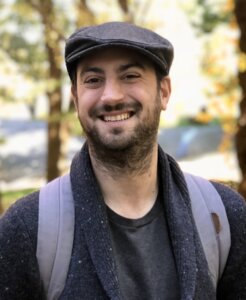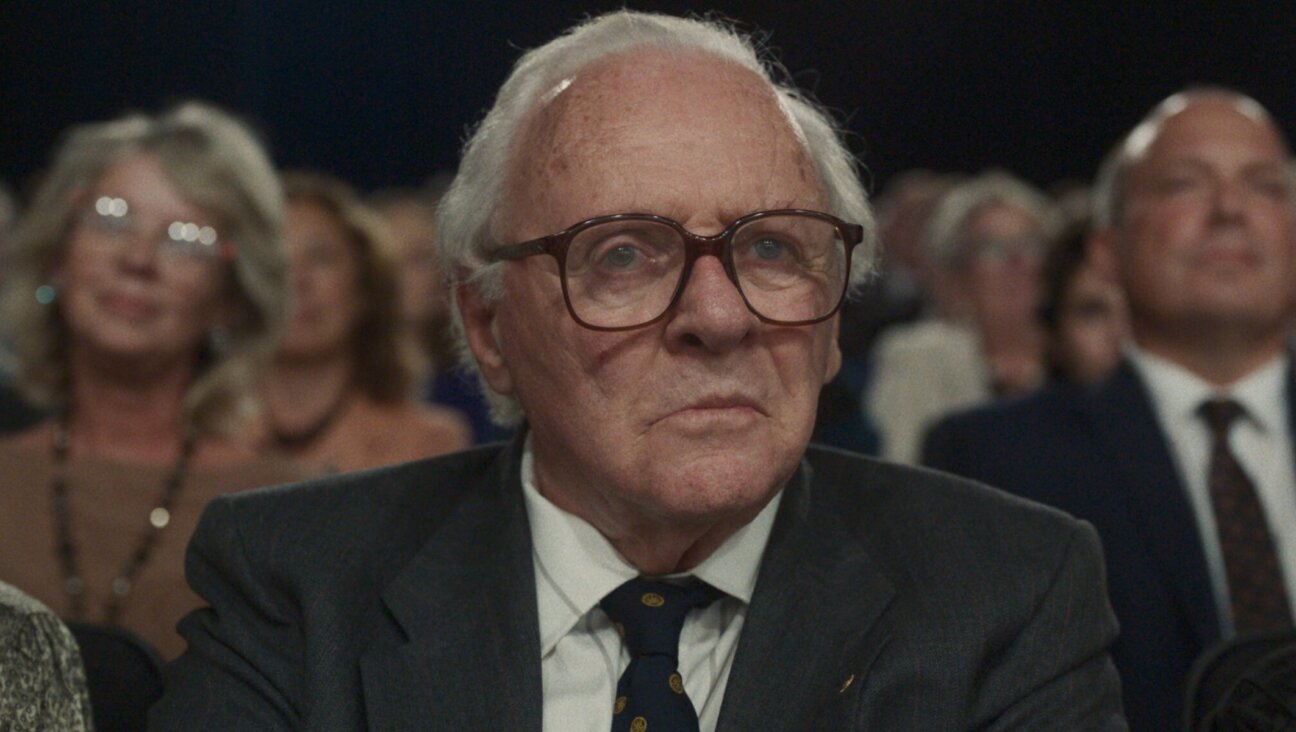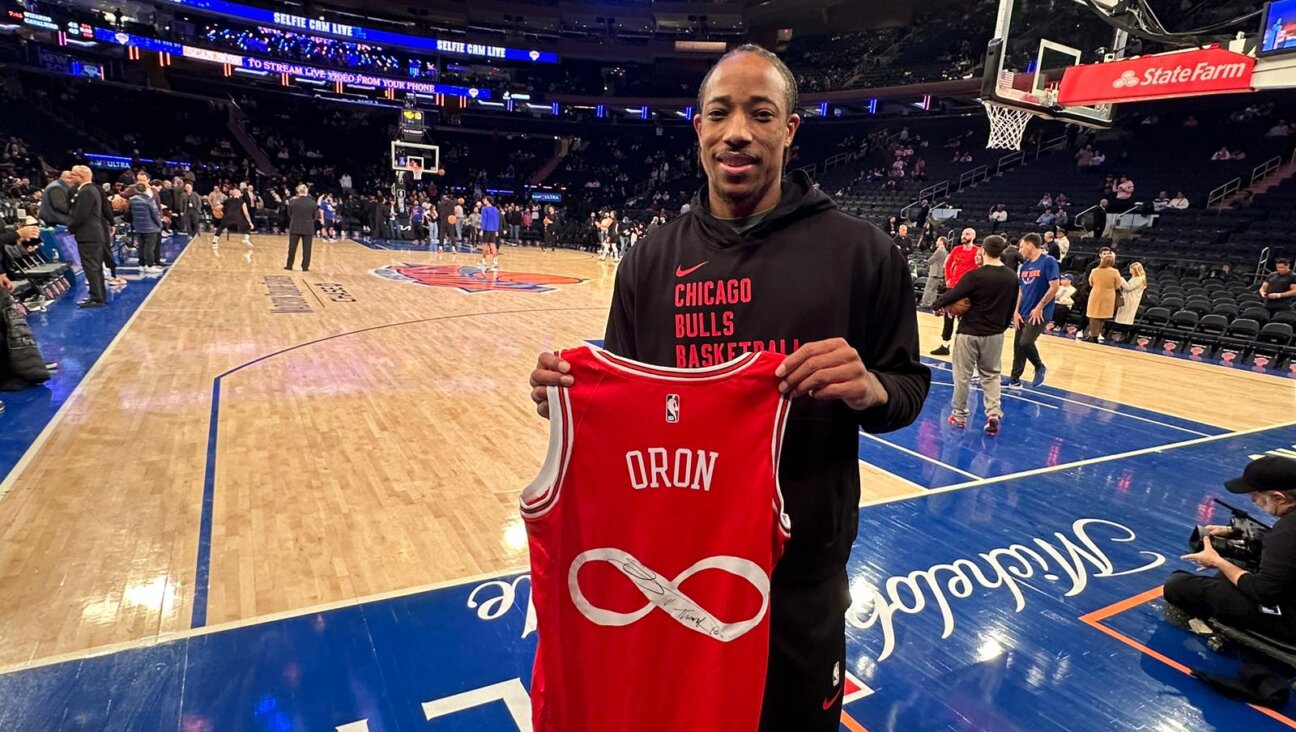‘Do you condemn Hamas?’ — why a seemingly legitimate question has become controversial
Does the question address the left’s moral failings or is it being used as a smear tactic?
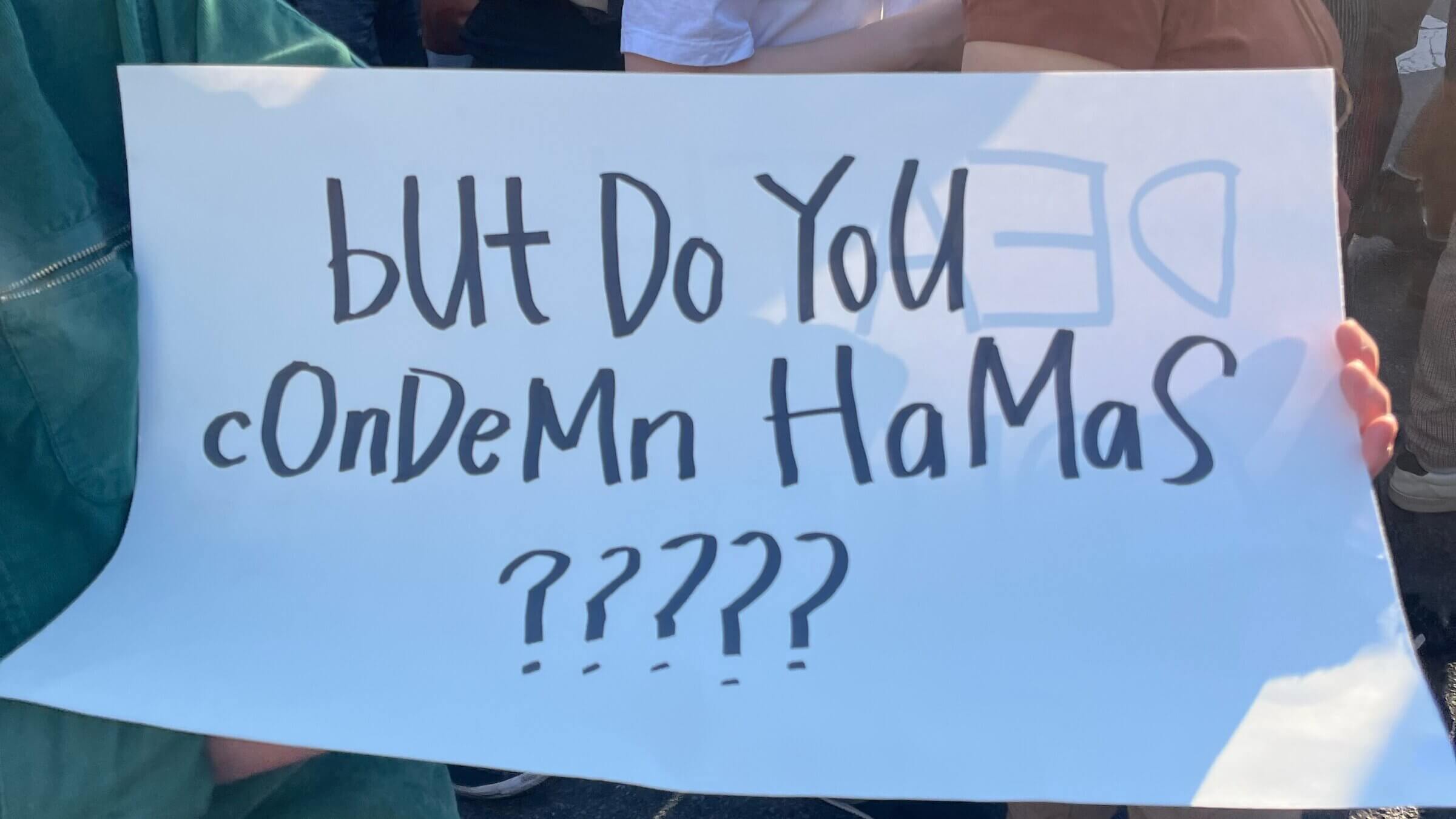
At a pro-Palestine march, a woman carries a sign asking, ‘But do you condemn Hamas?’ Photo by Andrew Silverstein
“bUt Do You cOnDeMn HaMas?????”
The sign floated in the distance above the crowd at a pro-Palestine march that shut down the Brooklyn Bridge at the end of last month.
Helicopters and drones hovered overhead. Around 1,800 police officers stood watch. Protesters in the crowd covered their faces with N95 masks or kaffiyehs. Most people I spoke to refused to give their full names; several said they feared being doxxed and losing their jobs or being harassed for attending.
And above it all — handwritten in black marker — that question that was on many onlookers’ minds: “bUt Do You cOnDeMn HaMas?” The same question was asked of British Labour Party former-leader Jeremy Corbyn, which caused a stir in his party. Hollywood screenwriters asked their union leaders the question after they failed to issue a statement after the attack.
To critics, the question prioritizes Jewish over Palestinian suffering. In a viral cartoon, a Palestinian mother grieves her dead child while a half-dozen TV reporters shove microphones in her face, asking, “But do you condemn Hamas?” For others, it’s a simple question that addresses a moral failing by those on the left who don’t denounce the Oct. 7 massacre.
At the protests I’ve covered, the placard was not a symbol of moral consciousness. The alternating caps, a millennial meme inspired by SpongeBob SquarePants, conveyed a mocking tone. It was an inside joke, poking fun at the constant demand made of anyone protesting Israel’s siege of Gaza. Most protesters and virtually all Jewish activists I’ve spoken with do condemn Hamas’ massacre, but they bristle at the question.
Legitimate question or smear tactic?
As much as activists see the question as a form of misdirection or a smear tactic, the question of where the movement stands on Hamas hangs over it. Clips of an Oct. 8 rally in Times Square, with the crowd celebrating rockets falling on Israel and a protester flashing a swastika, caused outrage.
Since then, much of the public focus has shifted from the gruesome details of the Oct. 7 attack to the brutality of Israel’s response. Reports of antisemitic incidents in the U.S. remain a daily occurrence, but the call for a cease-fire has found mainstream support.
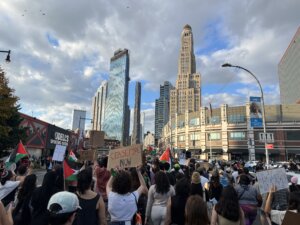
“The net has been cast much wider over the course of the month,” said Jozi Zwerdling, a 35-year-old Washington, D.C.-based social worker who has attended several recent pro-Palestine actions as a member of IfNotNow, a Jewish anti-occupation group. At the first rallies, she said, there were mostly seasoned activists, Palestinian Americans, and others with personal connections to the region, but that has since changed. “There are people who are not necessarily radical, are not necessarily anti-Zionists, who say we don’t believe in war this way,” said Zwerdling,
Still, the charges of pro-Hamas sympathies among marches persist. A recent headline in National Review reads, “Pro-Hamas protesters are the movement, not outliers.” Former New York City Councilman David Greenfield characterized the pro-Palestine Brooklyn marchers as pro-Hamas, a charge that Brian Hauss, a senior staff attorney at the American Civil Liberties Union, compared to likening the Civil Rights Movement to a Communist front.
Abed Ayoub, the executive director of the Arab-American Anti-Discrimination Committee, described the rhetoric as an escalation of the continued demonization of the Palestine Solidarity movement. “Labeling all protestors as ‘pro-Hamas’ is simply another way to discredit all criticism of Israel and opposition to the war on Gaza,” he said in a statement.
The pro-Hamas charges go further than the longstanding suggestions that criticism of Israel is antisemitic. Hamas is a U.S.- and EU-designated terrorist organization, and pro-Hamas accusations threaten the movement’s legitimacy.
The anti-Zionist activist Ariel Koren said in a tweet that the Guardian forced her to include a condemnation of the Hamas attack in her recent op-ed arguing that Israel is pursuing genocide in Gaza.
Condemning Hamas allows entry into the public discourse; not condemning leaves activists vulnerable to serious repercussions. The state of Florida banned Students for Justice in Palestine, a student group that Gov. Ron DeSantis claimed supports terrorism, a federal crime. The Anti-Defamation League and Republican politicians have called for investigations of SJP activists for Hamas sympathies. The past week, Brandeis also banned its SJP chapter.
Within Our Lifetime, the group that organized the Brooklyn march and other New York rallies, has walked back its most militant messaging. At the end of October, the group’s website called the Hamas attack an inspiration to the world. Since then, the praise of the massacre has been replaced with a denunciation of Israel’s attack of Gaza. The organization’s founder, Nerdeen Kiswani, recently criticized New York Mayor Eric Adams for endangering Arab Americans and protesters. She told New York Magazine that the mayor suggested that “everyone who goes to these rallies are terrorist sympathizers.”
A wide variety of messages
As I made my way through the crowd, in search of whoever was carrying the “bUt Do You cOnDeMn HaMas” poster, I saw young Lubavitch men who had defied warnings that antisemitic violence might break out and were chanting the affirmation of Jewish survival, “Am Yisrael Chai” at protesters. “They want to kill Jews,” one member of the group said. “This is our response.”
Some protesters at the march, which came one day after Israeli ground forces entered the Gaza Strip, wore T-shirts from Jewish Voice for Peace. Others wore Muslim garb; some carried Puerto Rican or rainbow pride Palestinian flags. Teachers marched together, as did families with young children.
“We haven’t heard from them in seven days,” Maria, a 31-year-old Palestinian American living in Brooklyn, said of the family she still has in Gaza. She showed me a photo of the home in the Arab village Dayr al-Qassi, now northern Israel, which her grandparents were forcefully expelled from in 1948. “I feel horrified and angry.”
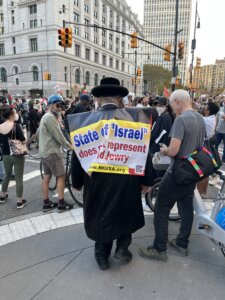
Jack, a 27-year-old teacher at a Jewish school, wore a kippah but also a mask to hide his identity. “I feel safe in the protest,” he told me. But the danger, he said, would be if his students’ parents knew he was demonstrating. “My job would be at risk.”
Much of the pro-Palestine movement seems to have coalesced around the call for a cease-fire, but protesters expressed a wide variety of messages.
“We want peace,” said Thomas, 35, as he pushed his two young children in a stroller. This was his and his wife’s first pro-Palestine action. “Killing civilians is wrong on either side,” he said.
Drivers stuck in snarling traffic honked in support. Some onlookers joined in the chants of “Free Palestine!” Others just stared at the “End the Occupation” banners and the “No Apartheid, No Genocide” posters.
Before the Brooklyn Bridge entrance, Joyce, a senior Jewish woman, bumped into the march while returning home from the library. “I understand their point of view, however, Hamas went into Israel and beheaded babies,” she said. “These people are forgetting that.”
David Steinberg, a 31-year-old tech investor who lived four years in Israel, saw banners with the slogan “From the River to the sea, Palestine will be free,” and concluded: “It’s inherently antisemitic.”
I didn’t see any specific mentions of Hamas and many marchers seemed unaware of some of the more incendiary slogans on display, but I tried to gauge people’s feelings towards the group.
Adrianna, a 35-year-old hypnotherapist from Bedford-Stuyvesant, carried a sign that read “Free Palestine! Love Jewish People. Cease Fire Now.”
“A genocide is unfolding before our eyes,” said Sima, a Farsi translator from Brooklyn, who was holding a sign with an image of a child standing amid the rubble of Gaza, “I am here as one human for another.” She refused to condemn the Hamas attack. “I don’t want to fall into that trap,” she said.
The trap, as activists explained it, is starting the narrative on Oct. 7, which omits the preceding years of Gazans being occupied and fenced in. They see it as a demand to condemn only one type of violence — the horror-show spectacle of the Hamas attack — but not an airstrike on an apartment tower or the slow drip of daily violence Palestinians endure.
Jack said he believes the question about condemning Hamas is simply meant to shut down discussion. “It’s a one-sided question never reflected back on,” he said.
The other side of the sign
By the time I caught up with the woman with the “bUt Do You cOnDeMn HaMas?????” sign, her response to the question was clear. The opposite side of the placard read “Death to Colonizers.” The lettering didn’t convey any sarcasm.
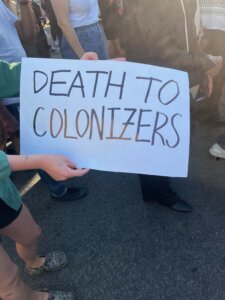
The sign was the handiwork of a masked 28-year-old Asian-American activist, who spoke on the condition of anonymity. I asked her about the sign. Polite and soft-spoken, she read a prepared statement on her iPhone, which sounded more Marxist than Islamist; it affirmed the oppressed’s right to resist those she called, “the génocidaires.” I strained to listen to the academic justification of the murder and rape as the crowd chanted: “Netanyahu, what do you say? How many kids did you kill today?”
As I looked around, other messages in the vein of “Death to Colonizers” were few and far between, though they were not completely absent. At the front of the march was a banner that read, “By Any Means Necessary” above Within Our Lifetime’s social media handle. That sign led Haaretz to report that the protesters stood “behind a sign legitimizing the Hamas terror.”
But protesters I spoke with did not even seem aware of the banner at the front, or of the organizers’ platform. Several registered concern that the protest was being misconstrued by the media. “I feel like they want to grab on to anything to try to demonize Palestinians,” said Maria.
“I condemn any loss of innocent life,” she said, “I am just hurt that no one has ever said that for my people.”



